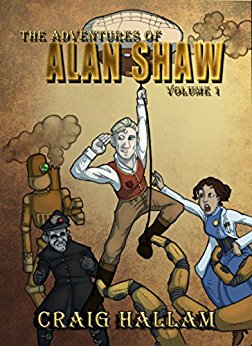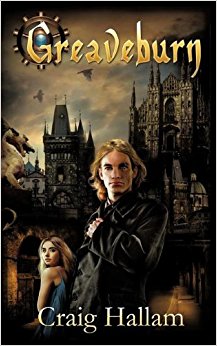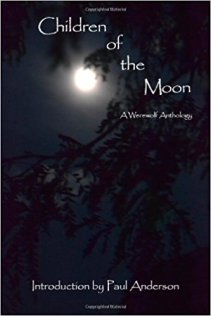A former nurse, Craig Hallam has written about werewolves, bogeymen, a heroic street urchin, and a book about living with depression. A significant figure on the Steampunk scene who has been writing short stories since 2008, his tales have graced the pages of the British Fantasy Society, Misanthrope Press and Murky Depths. His debut novel, Greaveburn, was extremely well received by readers who regularly beg him for more of this murky, Gothic-inspired world of murderers, heroes, and a lonely girl. Will he oblige? Read on…
“Greaveburn stood alone on this little circle of earth, the river running around and into itself like a snake eating its tail. And Abrasia was doomed to watch the sun and stars trade places for all eternity.”
― Craig Hallam, Greaveburn
Hi Craig, thanks for agreeing to be interviewed for my blog; Flailing Through Life…
Me: And talking about flailing; Do you ever find yourself ‘flailing through life’?
Craig: Every damned day! I think if you’re not flailing then you’re ignorant of how complex and magical life is. If your life is so simple that there’s no flailing to be had, then you’re not living it right 😊
Me: For readers who don’t know, Craig, you have been, like Kit Cox who was interviewed earlier, rather involved in the world of Steampunk –and your earlier books dipped into this genre; ‘Greaveburn’ and ‘The Adventures of Alan Shaw’. For readers who may not have heard of Steampunk (Still!), could you give a ‘general’ explanation in relation to your writing?
Craig: I like to describe it as Victorian-inspired fiction covering everything from Mary Shelley through Jules Verne and H.G. Wells. My personal favourites lean more toward the Gothic works of Robert Louis Stephenson, Mary Shelley and Bram Stoker. It’s also an aesthetic movement that focuses on Victorian clothing and gadgetry.
Me: You were a nurse (*Take my hat off to you – if I wore one) prior to being released onto the world, as an author. How does being an author compare to being a nurse, and are there any similarities?
Craig: Being a nurse sets you in a very special position that allows you to observe humans at their most vulnerable (sounding slightly like serial killer, there). That vulnerability leads to the rawest human emotions; expressions of anger, fear and hope that, for a fledgling author, is invaluable. I always try to make my characters real for the reader. They are all flawed, which I believe is pivotal in what it means to be human. If your characters are too perfect, what is there to relate to? Those years of nursing really helped with that.
It also meant that I had a lot of night shifts to write on. My first novel, Greaveburn, was written exclusively in the wee hours of the morning. That probably explains a lot of the plot, actually.
So, as for similarities, I can’t think of two jobs more different, but one certainly feeds the other.
Me: What has been your hardest scene to write, so far? And why?
Craig: There’s a scene in the latest Alan Shaw novel (out later this year – *insert subtle marketing here*) that was quite tough. Alan returns home to London, after years of wandering the world and having no connection to everyone he knew, to find that everyone has long-since presumed him dead. The city has had a small statue erected to him in Covent Garden where he was pivotal in saving the city as a boy. For Alan, it was the realisation that perhaps the things he has done wrong in his life, and the guilt that he feels, don’t necessarily outweigh the good. That was a big turning point for Alan’s character. It had to be just right. I got a little teary writing that one.

Me: How long, on average, does it take you to write a book?
Craig: About a year to a year and a half. It was always tough with working full time, writing, and then doing my degree work at the same time. Now a lot of that has settled down, I’m finding it much easier. I wrote Down Days, an insight into living with depression, in a month or so between other projects (its only 25k words, so hardly a tome). Other than that, I always have a few books on the go at once. I like to be able to skip between them as the inspiration strikes. Currently, I’m working on Alan Shaw 3, a cyberpunk novel, and a horror novella. I don’t make things easy for myself. Maybe if I was less attracted to every shiny story idea, I could write faster.
Me: Have you ever read a book that made you cry? If so, what was it? And have you ever shed a tear when writing one of your own novels?
Craig: I cry quite often when writing my novels. The previous example was just one of many. I really get invested in my characters. It’s happened more with Alan Shaw than ever before, but his experiences can be quite poignant and raw. At least, that’s how I try to write them. Maybe I just cry over anything.(Me: So I’m not the only one!)
I can’t think of any books that have made me cry. I did read an M.R. James short story that made me physically jump, though. I must have been really into the story because I leapt almost out of my seat. I then went back and tried to pick the story apart to find out how it worked. I always take tips from great authors.
Me: As a writer of Speculative Fiction, would you agree that it is the authors of this genre and Science Fiction who most clearly see the future of the human race?
Craig: I think that Sci-Fi authors have a special ability regarding balance. They have to be able to see the world as it truly is, create new worlds that mirror our own, and make the stories that they tell relevant to the now as well as the soon-to-be. That’s hard to do. Philip K. Dick is a personal favourite. Not in the way that the things he predicted have all happened, but in a way that he shows us a future where the meaning of what it is to be human and what it is to live in our reality are brought into sharp focus. His novels give me an insight into myself, and that is the true skill of a Sci-Fi author.
Me: How do you balance the demands of the reader with what you really want to create yourself?
Craig: I don’t, really. That sounds horrible, but it’s true. I write the story as it needs to be told. The story itself defines how it goes. I do very little planning, really, only having the broadest strokes of a story when I start to type. My writing is quite an organic thing. I’ll have the idea that, for instance, a group of main characters who are all villains in a Gothic city which no-one can escape. Then I think about the themes. Greaveburn was very much about the love of one girl, in an odd way. Abrasia’s character was loved by everyone in their own way; from the perspective of a father, a brother, as someone through which they might find redemption, or in a covetous love and a desire to control her. That gave every character a mutual point of reference for their dastardly deeds. Of course, that Abrasia herself is struggling to find people that she can trust makes the tension even more vibrant.
People have asked and asked for a sequel to Greaveburn, but there isn’t one. The fact that the story ends where it ends is indicative of the uncertain state of the city, the characters and their joint future. I love that people want more, it means that I’ve left them with that indefinite feeling, which was the point. But I won’t throw out a sequel just for the sake of it. If there ever comes a Greaveburn 2, in the distant future, you can be certain that it will be a strange one. Possibly even one that people seeking answers will hate.
It sounds a little pretentious, perhaps, but always giving the reader what they want is sometimes not what they want at all. Some of the best books I’ve ever read have left me thinking about the what-ifs for days and weeks, sometimes years later.
Me: If you had to do something differently as a child or teenager to become a better adult, what would you do?
Craig: That’s a tough one. I’ve been very lucky and had quite a varied life. I worry about the butterfly effect with questions like this. If I change something, would that make me a different me? What if the thing that I change led to the moment when I first set pen to paper?
I’ll change nothing, I think. I’ve seen too many incredible things in my every day kind of life, and made too many awesome mistakes. Every one of those things has informed the messed-up adult that I am. Without the mess, there might not be any stories. For good or ill, I’ll take what I’ve got.
Me: And finally, what is your favourite childhood book?
Craig: The Colour of Magic by Terry Pratchett. I read that book until my eyes bled. I still read it now. And I think it was what got me first thinking creatively, and sparked my own stories. I never got to meet Mr Pratchett but I owe him a great debt of gratitude.
Thank you so much for agreeing to be interviewed.
Thanks for having me!
You can find Craig on Twitter at @craighallam84, at https://www.facebook.com/CraigHallamAuthor/. He also runs a blog on living with Depression at www.downdays.org.
Next time; Mehitobel Wilson on boots, fear and dolls! Join me then.



